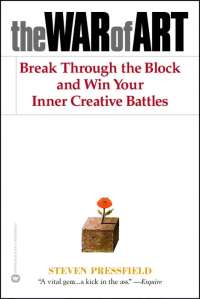Ok, by best, I mean non-fiction book (the best fiction book goes to the Steig Larson’s “Girl Who Kicked The Hornest’s Nest.”) The Accidental Creative: How To Be Brilliant at a Moment’s Notice, though, holds in it all the practices and principles that I could only hope every creative executive. The author Todd Henry and the complimenting web site are dedicated to “free[ing] creative teams to do brilliant work. We do this by equipping them with the proper mindset, the right tools, and the systems they need to thrive.” In fact if I had found the book and the site earlier this year, I may not have started this blog.
The author, a self-described “arms dealer for the creative revolution” provides tools for anyone to bring consistent brilliance into their daily lives. If there is a phrase that could trump “highly recommend” or “strongly urge” I would insert that now. Henry speaks to any individual who is called upon to generate ideas and solve problems–from artists to product managers–this book can change your life. I mean that.
Henry understands to the toxic habits and convoluted reasoning that plague many corporate environments. I smiled and shook my head several times as I read this book. I wondered if he ever walked the halls of my old office buildings seeing statements such as “a workplace in which rationalization and mediocrity become the norm. Innovation is often the rallying cry, but bunting for singles is the everyday ethic.”
From this vantage point he offers acute diagnosis for what prevents us from being consistently creative. Then he follows his analysis with cures that can be implemented immediately. Henry says, “To unleash your creative potential now and thrive over the long-term, you need to establish your own rhythm–one that is independent of the pressures and expectations you face each day.”
The most profound teaching for me was Henry imploring his readers to live with intentionality, choice and discipline. “…effective creating begins the moment you decide to reclaim the natural rhythms of your creative process and structure your life around them.” As with any “self-help” or instructional book, it’s some times hard to implement all the suggestions consistently and correctly. But living with intentionality, choice and discipline was the starting point I chose and it has infected my entire life.
Intentionality means I only go with the flow on vacation. I wake up every morning with purpose and focus. In my case, to be a great storyteller. More importantly, I check in with myself to make sure that I’m on track to accomplish my goals from time to time. Choice means I remind myself of each day’s opportunity cost. If choose to watch X amount of hours of television, that also means I choose not to spend that time reading, writing or working on my goals. “You can do almost anything you want, but not everything you want.” Discipline means getting the task done despite how I feel. “Comfort is frequently the enemy of greatness.”
My apologies for so many quotes, but the book is just that good. Henry hits the mark. If you are looking for a book to jumpstart a sluggish career or seeking methods to improve your creativity, this is the book for you. I’ll be referring to it regularly as I re-enter the workforce. (Read more on that here.)
Check out this video about the book. It’s just as good as my review. (wink)










